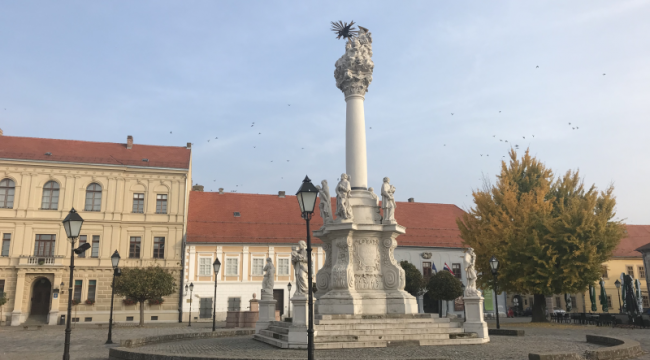Impressions from fieldwork: ‘I have never done these things with English!’

As part of our ongoing psycholinguistic research on figurative language processing, our Metaphor strand took three experiments on the road in November 2018 to test learners of English in Osijek, Croatia.
The first experiment (a priming study) looked at how non-native speakers process conventional English metaphorical expressions (such as open an account or expose the truth) and whether it differs from the way English native speakers process them.
The two remaining experiments (self-paced reading tasks) dealt with creative metaphors. One experiment looked at whether different levels of creativity in metaphors affect how non-native speakers process figurative expressions, for example metaphors that are easily comprehensible like the mind is a sponge vs. metaphors that are more difficult to comprehend like money is penicillin.
The last experiment explored whether non-native speakers draw distinctions between different types of creativity in metaphors: the ones that are conceptually familiar but novel, and the ones that are novel and not conceptually familiar. For instance, two novel metaphorical expressions could be stiff loan and purple loan. Stiff loan is based on previously existing concepts (flexible loan); on the other hand, purple loan is not based on such concepts.
For these experiments, we recruited intermediate and advanced speakers of English at the Faculty of Humanities and Social Sciences at the Josip Juraj Strossmayer University of Osijek. This type of research was a new experience for the participants and we received very positive feedback after their participation.

Participants were particularly intrigued by the language biography questionnaire. Many participants found it highly thought-provoking to think consciously and deliberately about the amount of time they devote to using different languages throughout the day. This confirms the experience of members of our research team: we rarely think about changes in our language use in the course of our lives. This can lead to interesting realisations about how languages and dialects that surround us at different stages of our lives affect our linguistic biographies.
The three behavioural experiments we conducted collected reaction times, which meant participants had to be focused while pressing buttons on a joystick. Most of them found the tasks and stimuli fascinating and couldn’t wait to hear what it was about! Some of them pointed out that, even though they are exposed to English through TV and music, they actually rarely get a chance to do things with English. Taking part in these experiments allowed them to focus consciously on language and perhaps think about it in different, novel and creative ways. Furthermore, participants found it simulating to think about different types of metaphor, both the highly conventional ones, and the highly creative ones. This also motivated them to think about similar examples in other languages they know.
The fieldwork trip proved immensely rewarding, both for myself as a researcher, and for the participants. It offered a valuable opportunity for talking about my research in detail to interested non-academics and for raising awareness about language use. The participants’ feedback showed that they found their participation invigorating and inspiring, making them think about language, and languages, in ways they had not previously had the opportunity to do.
We'd like to thank the Faculty of Humanities and Social Sciences in Osijek and the Language and Brain Lab (Oxford) for their support. This research was conducted in collaboration with Strand 2 (Prof A. Lahiri), as well as Prof J. Littlemore and Prof J. Barnden from the University of Birmingham.
Ana Werkmann Horvat is a Post-doctoral Researcher on our 1st strand: The Creative Power of Metaphor.
Where next?
Korean pop: BTS and fan translation